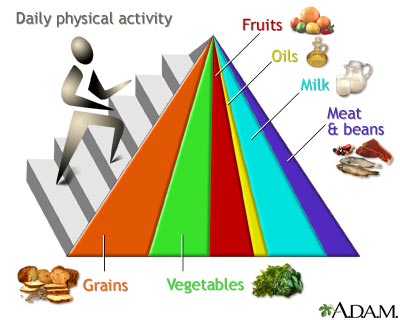Symptoms & Signs
To be diagnosed with anorexia, a person must:
* Have an intense fear of gaining weight or becoming fat, even when they are underweight
* Refuse to keep weight at what is considered normal or acceptable for her age and height (15% or more below the expected weight)
* Have a body image that is very distorted, be very focused on body weight or shape, and refuse to admit or acknowledge the seriousness of weight loss
* Have not had their period for three or more cycles (in women)

People with anorexia may severely limit the amount of food they eat, or eat and then make themselves throw up. Other behaviors include:
* Cutting food into small pieces or moving them around the plate rather than eating
* Exercising all the time, even when the weather is bad, they are hurt, or their schedule is busy
* Going to the bathroom right after meals
* Refusing to eat around others
* Using pills to make themselves urinate (water pills or diuretics), have a bowel movement (enemas and laxatives) or to decrease their appetite (diet pills)
Other symptoms of anorexia may include:
* Blotchy or yellow skin that is dry and covered with fine hair
* Confused or slow thinking, along with poor memory or judgment
* Depression
* Dry mouth
* Extreme sensitivity to cold (wearing several layers of clothing to stay warm)
* Loss of bone strength
* Wasting away of muscle and loss of body fat
Diagnosis & Tests
Other causes of weight loss or muscle wasting must be ruled out with medical testing. Examples of other conditions that can cause these symptoms include:
* Addison’s disease
* Celiac disease
* Inflammatory bowel disease
Tests should be done to help determine the cause of weight loss, or what damage the weight loss has caused. Many of these tests will be repeated over time to monitor the patient. These tests may include:
* Albumin
* Bone density tests to check for thin bones (osteoporosis)
* CBC
* Electrocardiogram (ECG or EKG)
* Electrolytes
* Kidney function tests
* Liver function tests
* Total protein
* Thyroid function tests
* Urinalysis
Anorexia nervosa: Overview, Causes
Anorexia nervosa: Symptoms & Signs, Diagnosis & Tests
Anorexia nervosa: Treatment
Reviewed By : David B. Merrill, MD, Assistant Clinical Professor of Psychiatry, Department of Psychiatry, Columbia University Medical Center, New York, NY. Also reviewed by David Zieve, MD, MHA, Medical Director, A.D.A.M., Inc.
